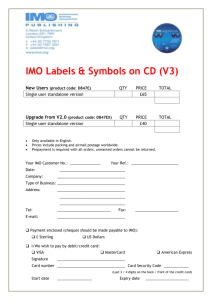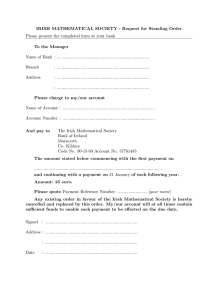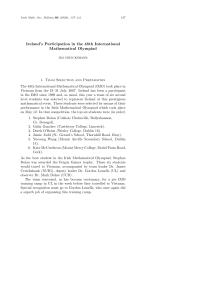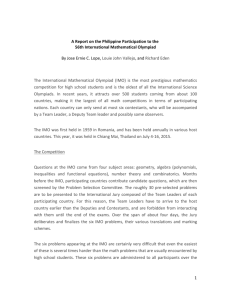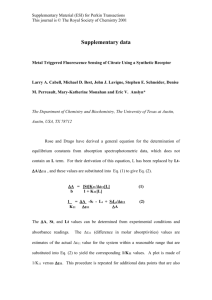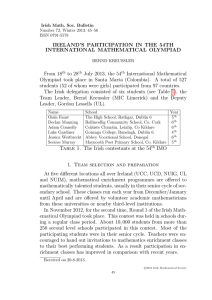IRELAND’S PARTICIPATION IN THE 55TH INTERNATIONAL MATHEMATICAL OLYMPIAD From 3 until 13
advertisement
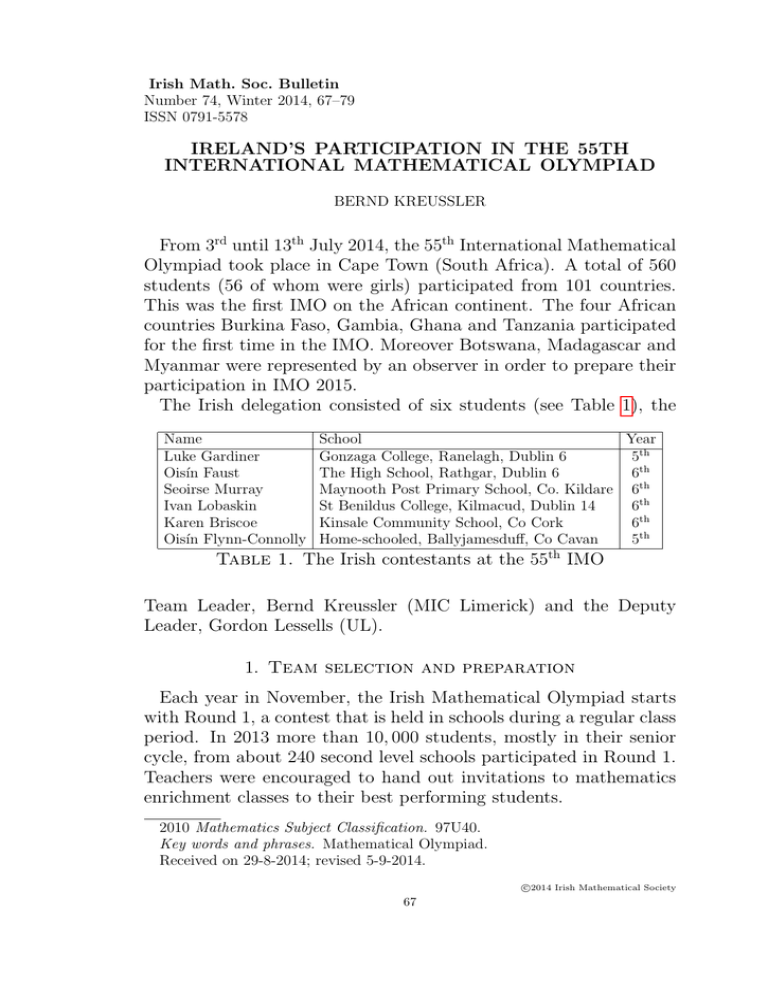
Irish Math. Soc. Bulletin Number 74, Winter 2014, 67–79 ISSN 0791-5578 IRELAND’S PARTICIPATION IN THE 55TH INTERNATIONAL MATHEMATICAL OLYMPIAD BERND KREUSSLER From 3rd until 13th July 2014, the 55th International Mathematical Olympiad took place in Cape Town (South Africa). A total of 560 students (56 of whom were girls) participated from 101 countries. This was the first IMO on the African continent. The four African countries Burkina Faso, Gambia, Ghana and Tanzania participated for the first time in the IMO. Moreover Botswana, Madagascar and Myanmar were represented by an observer in order to prepare their participation in IMO 2015. The Irish delegation consisted of six students (see Table 1), the Name Luke Gardiner Oisı́n Faust Seoirse Murray Ivan Lobaskin Karen Briscoe Oisı́n Flynn-Connolly School Year Gonzaga College, Ranelagh, Dublin 6 5th The High School, Rathgar, Dublin 6 6th Maynooth Post Primary School, Co. Kildare 6th St Benildus College, Kilmacud, Dublin 14 6th Kinsale Community School, Co Cork 6th Home-schooled, Ballyjamesduff, Co Cavan 5th Table 1. The Irish contestants at the 55th IMO Team Leader, Bernd Kreussler (MIC Limerick) and the Deputy Leader, Gordon Lessells (UL). 1. Team selection and preparation Each year in November, the Irish Mathematical Olympiad starts with Round 1, a contest that is held in schools during a regular class period. In 2013 more than 10, 000 students, mostly in their senior cycle, from about 240 second level schools participated in Round 1. Teachers were encouraged to hand out invitations to mathematics enrichment classes to their best performing students. 2010 Mathematics Subject Classification. 97U40. Key words and phrases. Mathematical Olympiad. Received on 29-8-2014; revised 5-9-2014. c 2014 Irish Mathematical Society 67 68 BERND KREUSSLER At five different locations all over Ireland (UCC, UCD, NUIG, UL and NUIM), mathematical enrichment programmes are offered to mathematically talented students, usually in their senior cycle of secondary school. These classes run each year from December/January until April and are offered by volunteer academic mathematicians from these universities or nearby third-level institutions. Rarely, students who participate for the first time in the mathematics enrichment programme qualify for the Irish IMO team. Usually, those who make it to the team come back after their first enrichment year to get more advanced training. In order to activate the full potential of these returning students, last year an Irish Maths Olympiad Squad was formed. It consisted of the 11 best performing students at IrMO 2013, who were eligible to participate in IMO 2014. Between IrMO and the restart of the enrichment classes, for this group of students the following extra training activities were offered: two training camps (one in June and one at the end of August), a remote training which runs from September to December and participation in Round 1 of the British Mathematical Olympiad (November). The centrally organised remote training was offered for the first time in 2013. At the beginning of each of the four months from September to December, two sets of three problems were emailed to the participating students. They sent back their solutions before the end of the month by email or traditional mail to the sender of the problems, who gave feedback on their attempts as soon as possible. The eight trainers involved were: Mark Flanagan, Eugene Gath, Norbert Hoffmann, Bernd Kreussler, Gordon Lessells, John Murray, Anca Mustaţa and Andrei Mustaţa. An important component of the training for mathematical olympiads is to expose the students to olympiad-type exams. In recent years it became an established tradition in all five enrichment centres to hold a local contest in February or March. In addition, this year a number of students from Ireland was invited to participate in the British Mathematical Olympiad Round 1 (29 November 2013) and Round 2 (30 January 2014). I would like to thank UKMT, in particular Geoff Smith, for giving our students this opportunity. The selection contest for the Irish IMO team is the Irish Mathematical Olympiad (IrMO), which was held for the 27th time on Saturday, 10th May, 2014. The IrMO contest consists of two 3-hour IMO 2014 69 papers on one day with five problems on each paper. The participants of the IrMO, who normally also attend the enrichment classes, sat the exam simultaneously in one of the five centres. This year, a total of 104 students took part in the IrMO. The top performer is awarded the Fergus Gaines cup; this year this was Luke Gardiner. The best six students (listed in order in Table 1) were invited to represent Ireland at the IMO in Cape Town. During the past 12 months four training camps were organised at various locations. During these mathematically intense 3 to 5 day long events, students have the opportunity to socialise with their enthusiastic peers and to increase motivation for their work throughout the year. A kick-start camp for the remote training was organised in Cork for the wider squad from 28 August until 1 September 2013. From 4 to 6 June 2014 the wider squad for IMO 2015 was invited to a training camp that took place at MIC Limerick. As the LC Examinations started on these days, four of the six team members could not participate. A training camp for the six members of the Irish IMO team was held at the University of Limerick from 24 to 26 June 2014. The camps were organised by Anca Mustaţa, Bernd Kreussler and Gordon Lessells. The sessions with the students at these camps were directed by Mark Burke, Mark Flanagan, Eugene Gath, Norbert Hoffmann, Claus Koestler, Bernd Kreussler, Jim Leahy, Gordon Lessells, Anca Mustaţa, Andrei Mustaţa and last year’s team members Adam Connolly and Jessica Weitbrecht as well as this year’s team member Luke Gardiner. Immediately before the IMO a five-day joint training camp with the team from Trinidad and Tobago was held at the University of Cape Town. The sessions were conducted by the two Deputy Leaders Gordon Lessells and Jagdesh Ramnanan. The students seem to have enjoyed this setting very much. The basis for the success of the joint camp was that the members of both teams have comparable ability levels. A very special feature of this year’s preparation was that Luke Gardiner was invited to participate in two training camps for the British IMO squad. These were the Hungary/UK IMO camp in Hungary (27/12/13 – 3/1/14) and the IMO training camp at Trinity College, Cambridge (3–7 April 2014). As a result, he considerably improved his performance compared with last year and was only 70 BERND KREUSSLER one point short of a Bronze medal in South Africa. I would like to express my sincere thanks to UKMT, in particular to Geoff Smith, for their support of Luke’s talent. 2. The days in Cape Town The team (including Leader and Deputy Leader) arrived around noon on Tuesday, the 1st of July, at Little Scotia, a beautiful guest house within walking distance of the University of Cape Town (UCT). From Tuesday afternoon until Saturday, the team was engaged in an intense training camp. On Wednesday, the team from Trinidad and Tobago arrived at Little Scotia. The joint dinner on that day was an excellent opportunity to get to know each other. From Thursday until Saturday the two teams spent many hours together to work on a mix of interesting problems. Thanks to the support of John Webb we were able to use a seminar room at UCT’s Maths Department for the training sessions. As UCT lies at the foot of the Table Mountain, the daily walk to the training venue was a healthy morning exercise. On Wednesday morning a ten-minute drive took me to the Hotel Garden Court, half way between UCT and the City Centre of Cape Town. As usual, the Jury was kept separated from the contestants until after the end of the second exam. The Jury of the IMO, which is composed of the Team Leaders of the participating countries and a Chairperson who is appointed by the organisers, is the prime decision making body for all IMO matters. Its most important task is choosing the six contest problems out of a shortlist of 30 problems provided by a problem selection committee, also appointed by the host country. This year’s Chairperson of the Jury was Prof. Sizwe Mabizela. In his serene manner, he led the Jury meetings in a pleasant but purposeful and efficient way. Like last year, this year’s Jury made an effort to have one problem from each of the four areas (algebra, combinatorics, geometry and number theory) included in problems 1, 2, 4 and 5. There was, however, a shortage in good easy and medium problems on the shortlist and many leaders felt that the shortlist was slightly biased towards combinatorics. For example, contest problem 5 was shortlisted as number theory, but it has a definite combinatorial flavour. After 15 hours of Jury meetings with intense discussion, the six contest IMO 2014 71 problems were chosen and all translations and marking schemes approved. On Sunday 6 July, the Irish team moved from Little Scotia to student accommodation on the campus of UCT and the IMO got under way. The opening ceremony took place in Jameson Hall of UCT on Monday afternoon. During the traditional parade, the teams appeared in order of the first participation of their countries at the IMO. Halfway, just after the appearance of the host team, the procession was broken up with an entertaining and skillful circus performance. The two exams took place on the 8th and 9th of July, starting at 9 o’clock each morning. On each day, 4 12 hours were available to solve three problems. During the first 30 minutes, the students were allowed to ask questions if they had difficulties in understanding the formulation of a contest problem. The Q&A session on the first day of the contest, where 59 questions were asked, was not completed until 11.30 am, because scanning at the exam venue was very slow. On the second day, all the 105 questions were answered before 11.00 am. Some contestants complained about the low temperature in the exam hall – during these winter days in Cape Town night-time temperatures were close to freezing – but the Irish students went well equipped with sufficiently many layers of clothing to the exams. Thanks to the small distance between the leader’s hotel and the exam venue, the student’s scripts were available before 10 pm on the evening of the first exam day. Skimming through their work I quickly got the impression that this year’s team had performed very well. Three of the solutions to Problem 1 were easily seen to be worth 7 points, whereas those of Ivan and Karen needed more detailed inspection. At the end of the third meeting with the coordinators, after explaining their solutions in detail, it was agreed that these were worth full marks as well. After joining the contestants at UCT, Gordon and I went into the detailed study of our student’s scripts. With five complete solutions to Problem 1 and three full solutions to Problem 4 (geometry) this was a pleasant experience. On one of the coordination days, the students were entertained with an excursion to Cape Point, the Ocean View township and Boulder’s Beach with its Penguins. On the other day they were 72 BERND KREUSSLER given the opportunity to attend ’Celebrity Lectures’ delivered by John Barrow, Peter Sarnak and Günter Ziegler. Our students seem to enjoy such activities as they feel that it gives them a first view into mathematical research beyond olympiad related mathematics. As a special treat, in the evening after the end of the final Jury meeting, Po-Shen Loh, leader of the USA team and specialist in combinatorics, explained to a large audience of interested students how a constant c > 1 can be achieved in Problem 6. The final Jury meeting, at which the medal cut-offs were decided, took place on the evening of Friday, 11th July. The closing ceremony followed by a Farewell Party was held on Saturday on the UCT campus. The journey back home started for our team on Sunday evening. 3. The problems First Day (8th July) Problem 1. Let a0 < a1 < a2 < · · · be an infinite sequence of positive integers. Prove that there exists a unique integer n ≥ 1 such that a0 + a1 + · · · + an ≤ an+1 . an < n (Austria) Problem 2. Let n ≥ 2 be an integer. Consider an n × n chessboard consisting of n2 unit squares. A configuration of n rooks on this board is peaceful if every row and every column contains exactly one rook. Find the greatest positive integer k such that, for each peaceful configuration of n rooks, there is a k × k square which does not contain a rook on any of its k 2 unit squares. (Croatia) Problem 3. Convex quadrilateral ABCD has ∠ABC = ∠CDA = 90◦ . Point H is the foot of the perpendicular from A to BD. Points S and T lie on sides AB and AD, respectively, such that H lies inside triangle SCT and ∠CHS − ∠CSB = 90◦ , ∠T HC − ∠DT C = 90◦ . Prove that line BD is tangent to the circumcircle of triangle T SH. (Iran) IMO 2014 73 Second Day (9th July) Problem 4. Points P and Q lie on side BC of acute-angled triangle ABC so that ∠P AB = ∠BCA and ∠CAQ = ∠ABC. Points M and N lie on lines AP and AQ, respectively, such that P is the midpoint of AM , and Q is the midpoint of AN . Prove that lines BM and CN intersect on the circumcircle of triangle ABC. (Georgia) Problem 5. For each positive integer n, the Bank of Cape Town issues coins of denomination n1 . Given a finite collection of such coins (of not necessarily different denominations) with total value at most 99 + 12 , prove that it is possible to split this collection into 100 or fewer groups, such that each group has a total value at most 1. (Luxembourg) Problem 6. A set of lines in the plane is in general position if no two are parallel and not three pass through the same point. A set of lines in general position cuts the plane into regions, some of which have finite area; we call these its finite regions. Prove that for all sufficiently large n, in √ any set of n lines in general position it is possible to colour at least n of the lines blue in such a way that none of its finite regions has a completely blue boundary. √ √ Note: Results with n replaced by c n will be awarded points depending on the value of the constant c. (Austria) 4. The results The Jury tries to choose the problems in such a way that Problems 1 and 4 are easier than Problems 2 and 5. Problems 3 and 6 are usually designed to be the hardest problems. That this goal was met this year is reflected in the scores achieved by the contestants on the problems (see Table 2). The medal cut-offs were as follows: 29 points needed for a Gold medal (49 students), 22 for Silver (113 students) and 16 for Bronze (133 students). A further 151 students received an Honourable Mention. Overall, 38.2 % of the possible points were scored by the contestants, which is one point more that last year and the highest since 2004. 74 BERND KREUSSLER P1 P2 P3 P4 P5 P6 0 75 240 479 24 301 514 1 23 32 43 103 60 7 2 14 25 1 28 83 7 3 22 17 2 16 10 11 4 15 14 3 5 8 0 5 18 39 0 3 3 5 6 23 71 4 3 11 1 7 370 122 28 378 84 15 average 5.348 2.971 0.505 5.189 1.709 0.296 Table 2. For each problem, how many contestants achieved how many points Name P1 P2 P3 P4 P5 P6 total ranking Luke Gardiner 7 1 0 7 0 0 15 296 Oisı́n Faust 7 0 0 7 0 0 14 321 Seoirse Murray 2 3 0 7 0 0 12 367 Oisı́n Flynn-Connolly 7 2 0 1 0 0 10 387 Karen Briscoe 7 0 0 0 1 0 8 421 Ivan Lobaskin 7 0 0 1 0 0 8 421 Table 3. The results of the Irish contestants Table 3 shows the results of the Irish contestants. Writing a complete solution to a problem during the exam is a difficult task at a competition of this level, and is rewarded by the award of an Honourable Mention. All our students managed to achieve a complete solution of at least one of the problems. This is the first time ever that all students on the Irish team returned home with an award. The figures in Table 4 have the following meaning. The first figure after the problem number indicates the percentage of all points scored out of the maximum possible. The second number is the same for the Irish team and the last column indicates the Irish average score as a percentage of the overall average. This table shows that our students performed above average on Problem 1 (algebra). Never before has an Irish team scored 37 or more points on a single problem. Their performance on Problem 4 (geometry) shows improvement in this subject area compared with the past. Although the IMO is a competition for individuals only, it is interesting to compare the total scores of the participating countries. IMO 2014 75 Problem topic all countries Ireland relative 1 algebra 76.4 88.1 115.3 2 combinatorics 42.4 14.3 33.7 3 geometry 7.2 0.0 0.0 4 geometry 74.1 54.8 73.9 5 number theory 24.4 2.4 9.8 6 combinatorics 4.8 0.0 0.0 all 38.2 26.6 69.5 Table 4. Relative results of the Irish team for each problem This year’s top teams were from China (201 points), USA (193 points) and Taiwan (192 points). Ireland, with 67 points in total, shared the 64th place with the host country South Africa. This is the second highest result an Irish team has ever achieved. This year, three student achieved the perfect score of 42 points: Alexander Gunning (Australia), Po-Sheng Wu (Taiwan) and Jiyang Gao (China). The detailed results can be found on the official IMO website http://www.imo-official.org. 5. Outlook The next countries to host the IMO will be 2015 2016 2017 2018 2019 Thailand 4–16 July Hong Kong 6–16 July Brazil Romania United Kingdom 6. Conclusions This year’s Irish IMO team was one of the strongest in the 27 years of Irish participation at the IMO. Never before have all six students on the team been up to IMO standard in the sense that they could solve at least one of the problems completely. This is the first time ever that all six students on the Irish team returned home with an Honourable Mention. When comparing Ireland with other countries, it is more meaningful to consider relative ranks than looking at absolute ranks, because the number of participating countries has increased over the years. 76 BERND KREUSSLER This year, 37% of the participating teams scored less than the Irish team; this is the second best performance ever. Since Ireland’s first participation in 1988, the Irish teams won eight medals and 31 Honourable Mentions, ten of these in 2013 and 2014. This underscores the increased ability level of the current students. It is tempting to attribute the notable improvement over the past three years to the increased training activities. However, such a conclusion might be premature and it seems more prudent to wait a few more years to see if this improvement can be sustained. There is no doubt, however, that all the new training activities helped our students to develop their full potential. In this context it should be mentioned that Ireland’s involvement in the European Girl’s Mathematical Olympiad (EGMO) certainly had a positive impact on the training and performance of the IMO team members. On the one hand, Karen’s two participations at EGMO gave her a lot of useful experience. On the other hand, the extra training opportunities, geared towards the early date of EGMO in April, were offered to girls and boys alike. Considering Table 4, we see that our students performed above average on Problem 1 (algebra). Even though their performance on Problem 4 (geometry) shows improvement in this subject area, it is clear that there is still some work to be done until our students reach an average level score on an easy geometry problem. To sustain the achievement level of this year’s team, it seems necessary to increase the ability and confidence of our students to solve an easy IMO problem in all four subject areas (algebra, combinatorics, geometry and number theory). In light of this year’s success at the IMO, it is natural to continue to offer extra training opportunities for an Irish Maths Olympiad Squad that consists of those 10 to 15 best performing students at IrMO 2014, who are eligible to participate in next year’s IMO. These activities help to keep the students motivated and working on olympiad related material. Even tough the overall results of the Irish Team have improved during recent years, it is obvious that our students still have less experience in problem solving than the majority of the contestants from other nations. In addition to the enrichment classes, where the IMO 2014 77 basic material is taught, it is important that potential team members gain experience in solving challenging problems on their own in limited time. Important contributions to this aspect of the training are the local contests at the enrichment centres and the involvement in Rounds 1 and 2 of the British Mathematical Olympiad. Including practice exams in the schedule of the training camps should become the norm in the future. A number of other IMO teams regularly organise joint training camps that take place immediately before the start of the IMO. Joint sessions with other teams strengthen international relationships among mathematically gifted youth and enrich the training of all participating teams. The joint training in Cape Town with the team from Trinidad and Tobago was very successful and everybody agreed that similar camps should be held in future years as well, provided that sufficient funding is available. Prior to the IMO in Thailand 2015, such a camp could help the Irish contestants to adjust to the different time zone and the tropical climate. To be able to fund such camps and to send a full team of six students and possibly also an Official Observer to any of the next IMOs, efforts have to be increased to get sufficient funding. A generally established fact, based on the experience of many countries at the IMO, is that the earlier students are exposed to olympiad type problems the higher they are able to achieve in competitions and the more profoundly their problem solving skills are developed. Therefore, it seems to be imperative to get more students in their Junior Cycle, or even in Primary School, involved in mathematical problem solving activities. A few years ago, our colleagues at UCC initiated Maths Circles for Junior Cycle students in second level schools in the Cork area. As a follow-up to these, the training centre at UCC now runs Junior Maths Enrichment classes for students in second and third year. This initiative shows how it is possible to widen the scope of support of talent and interest in mathematics in Ireland. Two initiatives should be mentioned here which aim at the involvement of the majority of pupils in mathematical problem solving. One is the PRISM (Problem Solving for Post-Primary Schools) competition which is organised since 2006 by mathematicians from NUI Galway and which takes place in October every year during 78 BERND KREUSSLER Maths Week. This multiple choice contest has a paper for Junior Cycle students and one for Senior Cycle students. It normally attracts about 2 500 participants. The other is the International Mathematical Kangaroo Contest which, thanks to the hard work of Michael Cotter and Mark Flanagan, took place for the first time in Ireland in April 2014. This contest consists of a multiple choice test with problems designed for the general student, not only for students with a particular talent in mathematics. With six different age levels this contest is available for all students, from first class in primary school to sixth year in secondary school. 7. Acknowledgements Ireland could not participate in the International Mathematical Olympiad without the continued financial support of the Department of Education and Skills, which is gratefully acknowledged. Thanks to its Minister, Mr Ruairı́ Quinn TD, and the members of his department, especially Mary Whelan, for their continuing help and support. Also, thanks to the Royal Irish Academy, its officers, the Committee for Mathematical Sciences, and especially Rebecca Farrell, for support in obtaining funding. Also instrumental to funding the Irish IMO participation this year was the generous donation received by the Irish Mathematical Trust from Eoghan Flanagan, who was himself a member of the Irish IMO team in 1993 and 1994. Only this sponsorship, together with the funding by the DES, enabled Ireland to send a full team of six students with leader and deputy leader to the IMO. The pre-IMO training camp in Cape Town would not have been possible without Eoghan’s generous sponsorship. The foundation for the success of the contestants is the work with the students done in the enrichment programmes at the five universities. This work is carried out for free by volunteers in their spare time. Thanks go to this year’s trainers at the five Irish centres: At UCC: Tom Carroll, Sorcha Gillroy, David Goulding, Martin Killian, Clauss Koestler, Patrick McCarthy, Desmond McHale, Anca Mustaţa, Andrei Mustaţa and Jonathan Peters. At UCD: Mark Flanagan, Marius Ghergu, Kevin Hutchinson, Eugene Kashdan, Adam Keilthy, Tom Laffey, Rupert Levene, Gary IMO 2014 79 McGuire, Lan Nguyen, Helena Smigoc, Nina Snigireva and Masha Vlasenko. At NUIG: John Burns, James Cruickshank, Artur Gower, Niall Madden, James McTigue, Rachel Quinlan and Jerome Sheahan. At UL: Mark Burke, Ronan Flatley, Eugene Gath, Norbert Hoffmann, Bernd Kreussler, Jim Leahy and Gordon Lessells. At NUIM: Sonia Balagopalan, Stefan Bechtluft-Sachs, Stephen Buckley, Katarina Domijan, Peter Clifford, David Malone, John Murray, Anthony O’Farrell, James O’Shea, Lars Pforte, Adam Ralph, David Redmond and Richard Watson. Thanks also to the above named universities for permitting the use of their facilities in the delivery of the enrichment programme, and especially to University College Cork, Mary Immaculate College, Limerick and to the University of Limerick for their continued support and hosting of the pre-olympiad training camps. It should not go unnoticed that this was the twentieth time that Gordon acted as Deputy Leader of an Irish IMO team. A huge Thank You to him from all the Leaders and team members who enjoyed his skillful dealing with all the situations he has encountered over the years. Finally, thanks to the hosts for organising this year’s IMO in Cape Town and especially to the team guide in Cape Town, Eniola Kazeem. Special thanks go to John Webb, the Director of IMO 2014. E-mail address: Bernd.Kreussler@mic.ul.ie Bernd Kreussler, Mary Immaculate College, Limerick
